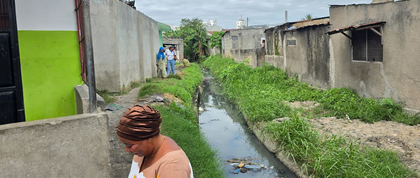
Source: NYU News
NYU students worked alongside professionals and community members in Tanzania to develop practical solutions to climate-related challenges in low income communities
Climate change can make weather events more extreme—from droughts and wildfires to heat waves and major storms. In poor neighborhoods of Dar es Salaam, the largest city in Tanzania, heavy rainfalls regularly overwhelm blocked drainage systems and flood homes, filling living rooms with garbage and human waste. These floods can lead to contaminated drinking water and illnesses like cholera.
That made the city a fitting setting this May and June for an NYU course focusing on strategies for how to limit those dangerous impacts. Developed in collaboration with UNICEF and hosted by the Muhimbili University of Health and Allied Science (MUHAS), the goal of the “A Systems Approach to Climate Change: Efficient Strategies for Local Mitigation” was to work with local communities to design realistic, cost-effective programs that respond to complex health challenges driven by climate change and poverty.
Chris Dickey, a clinical associate professor of global and environmental health at NYU School of Global Public Health, has taught versions of this class for the past 11 years all over the world, from Abu Dhabi and Asunción to Accra and Beirut. The locations and topics are driven by invitations from local or regional UNICEF offices, who reach out when their constituencies have a need. In recent years, courses have focused on vaccine hesitancy in the Middle East and North Africa and the mental health of Ukrainian refugees in Europe. More than 1,000 alumni of the course are now working across more than 100 countries.
Notably, its typical enrollment goes beyond who you’d typically find in a college classroom: government and NGO professionals in the class work on teams alongside NYU students. Together, they build skills to interact directly with community members so that their priorities and perspectives become the foundation of strategies to improve health and wellness.
“In my mind, one of the reasons why public health programs fail so frequently is that we tend to have people in London and New York and Geneva come up with programs, and then impose them on a community,” said Dickey. “This course grew out of a desire to change that dynamic and to have those programs start with the community in a ground-up approach.”